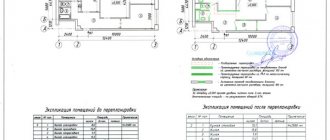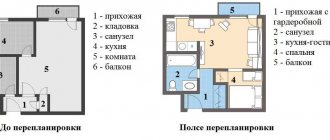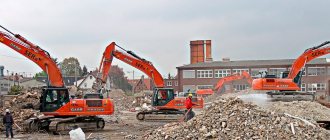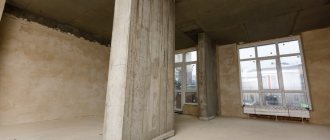Registration of redevelopment and reconstruction is a multi-stage process.
Dear readers! The article talks about typical ways to resolve legal issues, but each case is individual. If you want to find out how to solve your particular problem , contact a consultant:
+7 (499) 938-81-90 (Moscow)
+7 (812) 467-32-77 (Saint Petersburg)
8 (800) 301-79-36 (Regions)
APPLICATIONS AND CALLS ARE ACCEPTED 24/7 and 7 days a week.
It's fast and FREE !
It is not enough to obtain permission for these types of changes; after their completion, it is necessary for the Housing Commission to accept all changes and sign a special document.
It will be the basis for re-registration of technical documentation in the BTI.
And without this, the redevelopment cannot be considered complete.
Concept
The acceptance committee's act on the completion of reconstruction or redevelopment is a special document, the form and necessity of signing of which are established by law.
The execution of this document means that the construction and repair work associated with the redevelopment has been completed in full.
The owner of the apartment who received permission to transform the residential premises is obliged to notify about its completion and invite a specialist to inspect it.
This is a mandatory requirement established by law.
Definition
A special paper issued by the commission accepting converted housing after its alteration is an act of completion of the redevelopment (reconstruction) of the residential premises. Without this paper, the redevelopment (rearrangement) of the living space will be considered unfinished. It is this paper that is the basis for issuing new technical documentation to the Technical Inventory Bureau (BTI).
The owner (tenant) of the housing, after coordinating and approving the alteration of the living space, is obliged to invite a specialist from the Housing Inspectorate to inspect the housing after completion of the repair work. This requirement is mandatory and enshrined in the legislation of the Russian Federation (based on Article 28 of the Housing Code of the Russian Federation).
Legislation
The main law regulating the production of redevelopment and reconstruction is the Housing Code.
In chapter 4, art. 28 establishes the need to confirm the completion of these transformations by drawing up a special document.
But other legislation is also in force in this area.
Thus, the set of rules for design and construction contains:
- rules for inspecting load-bearing structures of a building;
- Rules for assessing the wear and tear of residential buildings.
There are also regional legislative documents.
For example, in 2021 in Moscow, the procedure for carrying out redevelopment and reconstruction is regulated by the “Fundamentals of the housing policy of the city of Moscow”.
How is the verification carried out?
During the inspection of the residential premises, the acceptance committee checks the visual compliance with the redevelopment project and checks the acts of hidden work. The availability of access to communication systems and the correctness of contracts and acts drawn up between the owner and contractors are also inspected.
The document is drawn up in 3 copies and signed by the acceptance committee. The document must also contain the signatures of the following persons:
- The owner or his representative;
- Representative of the design organization;
- Representative of a repair and construction organization;
- Representative of the housing inspection;
- Head of the housing inspection;
- A representative of the management company, in cases where this is required.
Information!
After the act is signed by the head of the MZhI, the owner can pick up his copy of the act from the inspectorate that conducted the inspection. The second copy will be sent to the BTI along with the project plan. The third will remain in the inspection archive.
When required
An act from the acceptance committee on the completion of reconstruction and redevelopment is required whenever these transformations took place according to the law, that is, with prior permission.
In this case, transformations in the premises are carried out according to a specially prepared project or sketch, and the acceptance committee checks the compliance of the repair work performed with these documents.
In the absence of such a document, the owner will not be able to complete the redevelopment.
Example of an apartment redevelopment project
Description 1
Back
Forward
You can find out the cost of services of qualified designers with the necessary SRO approvals using a calculator.
Receipt options
There are two options for issuing a certificate of completion of work, as well as ways to carry out redevelopment - with prior obtaining permission and after the transformations have been completed.
Before renovation
If redevelopment is just ahead, then you need to obtain permission from the relevant authorities to carry it out.
Depending on its complexity, a project is required or a sketch is sufficient, which the owner can make independently.
After completion of the repair, the owner notifies the relevant authorities and an on-site specialist checks the conformity of the transformations with the project or sketch, after which he signs the act.
Is it possible to redevelop a two-room apartment in a panel house? How much does it cost to legalize the redevelopment of non-residential premises in Moscow? Find out here.
After the reconstruction
If changes to the configuration of the premises were carried out without permission, and the owner wants to legitimize them, then this process should begin with the signing of an act of completion of the redevelopment.
It is drawn up on the basis of a technical conclusion on the admissibility and safety of the transformations carried out.
Then this document becomes the basis for legitimizing the complete redevelopment.
What does the document contain?
The acceptance committee enters the following information into the act of reconstruction and/or redevelopment of housing:
- Information about the property where redevelopment work took place;
- Information about the composition of the selection committee. Today, the commission necessarily consists of an inspector, and in cases where the work was related to common property, an employee of the management company;
- Information about the organization that carried out the repair and construction work;
- Information about the timing of work;
- Information about the redevelopment project and the design organization that compiled it;
- Data on the compliance of the work performed with the drawn up project plan;
- Information about carrying out hidden work. This implies the transfer of gas, water and electricity communication systems. To confirm compliance, you will need a hidden work certificate and an agreement with the contractor.
Acceptance committee report on completion of redevelopment
The acceptance committee report is a document that is filled out in a certain form by competent persons.
Failure to comply with the requirements for its execution makes this document invalid.
Who issues
The authority to accept the premises after the transformations carried out in it has been transferred to local governments.
They create a special acceptance committee.
If there is a Housing Inspectorate in a locality, then this body has such powers. Most often, whichever organization issues permission for reconstruction is the one that subsequently accepts the completed transformations.
One employee of this organization goes to the site of the redevelopment and checks all the changes made. If the transformations affected the common property of the residents of the house, then the presence of a representative of the Management Company is necessary.
What information is contained in the document
The acceptance certificate reflects the following information:
- information about the object in which the transformations were carried out;
- the composition of the acceptance committee (usually it is one person - an employee of the Housing Inspectorate, but sometimes the commission also includes an employee of the building management company, as we already indicated above);
- information about the organization that carried out the repair work;
- prescribed deadlines for all redevelopment work and actual deadlines for their implementation;
- information about the project in accordance with which the transformations were carried out, as well as about the design organization;
- compliance of the work performed with the design documentation;
- information about the existence of a hidden work report.
The hidden work report is drawn up during the renovation process, since upon completion it is impossible to see the waterproofing of the floors or changes in their design.
An employee of the Housing Inspectorate is also invited to sign it, who checks the compliance of the work with the project.
When signing the act of completing the redevelopment, the act of hidden work must already be drawn up, information about it must be included in the final document.
Sample filling
A sample of filling out the act can be requested from a housing commission employee who comes to inspect the premises after redevelopment.
The form of the work completion certificate is established by law. The document is filled out on a special form, where the inspector gradually enters all the information specified above.
The main part of the document is devoted to information about the redevelopment object and the changes presented to the commission in it.
Then the commission’s decision is recorded in writing: whether to consider the work carried out in accordance with the requirements of regulatory documents and the project (sketch).
The last paragraph indicates the appendices to the act:
- act of hidden work;
- acceptance certificates for individual systems;
- magazine of repair and construction works.
The act must be certified by the signature of the commission members and the seal of the organization that carried out the acceptance of the work.
What is being checked
The completion certificate is a kind of permission to put the facility into operation.
Therefore, the inspector must ensure that all legal requirements, as well as construction and repair standards, are met.
The acceptance committee employee must check:
- compliance of the transformations performed with the prepared project or sketch (the presence of a hidden work certificate, if such were assumed by the design documentation);
- availability of free access to general building utilities;
- compliance of the work with construction regulations;
- the correctness of the preparation of basic documents (concealed work report, work log, contract with a construction contractor), if work was carried out for which these documents are required.
The act of the acceptance committee completes the redevelopment, so the inspector bears a great responsibility.
Who signs
The redevelopment act is signed by several persons. Among them:
- owner of the redevelopment object;
- a representative of the design company (his presence is ensured by the owner of the premises);
- the company that carried out construction and repair work;
- Housing Inspectorate specialist;
- Head of the Housing Inspectorate;
- Chairman of the Management Company (if necessary).
The document on completion of work is signed by all parties in 3 copies.
One of them is given to the owner (through the “one window” service). The other is transferred by the Housing Inspectorate employees to the BTI, and the third remains in the Housing Inspectorate archive.
Required documents
In order for a Housing Inspectorate employee to accept a redevelopment project, the homeowner must provide certain documents to this organization:
- a statement indicating the number of permission to carry out transformations;
- work production log;
- a copy of the agreement with the construction organization to carry out the necessary repair work;
- a copy of the agreement on author's support of all transformations;
- approvals of SROs of all organizations involved in carrying out transformations at this facility;
- technical conclusion on the admissibility of changes to the configuration of this facility and the safety of all work performed (required if the redevelopment has already been carried out, and a certificate of completion of work is required to legitimize it).
Who signs the act
The acceptance certificate for apartment redevelopment must be signed by the following persons:
- Owner of the apartment . If the property has several owners, then signatures of each are required. If the co-owner is a minor under the age of 14, the parents sign instead. Minors aged 14 years and older sign the act independently, but in the presence of their parents and with their consent.
- Owner's representative . This is only relevant if the owner cannot or does not want to deal with the issue of renting out the apartment on his own. A representative needs a properly executed power of attorney. You will also need his passport.
- Representative of the management company (management company) . This is not a mandatory requirement, but sometimes the management company monitors any redevelopment carried out in its area of responsibility and sends its representatives.
- Designer's representative . The company that developed the project for which the redevelopment was carried out is obliged to send its representative to sign the act. It is the responsibility of the homeowner to call such a person. He is obliged to inform the company on time (at least a few days, or better yet weeks) about the inspection.
- Representative of repairmen . If the redevelopment was carried out with the involvement of third-party organizations, then a representative from them is also needed. The owner of the apartment is also obliged to inform them about the inspection, and he is also responsible for ensuring that the necessary representative arrives in a timely manner to inspect and sign the report.
- Representative of the Housing Inspectorate (Housing Inspectorate) . It is he who conducts the main inspection, checks the compliance of the apartment and the project, and also notes in the report all identified deficiencies, if any.
- Head of ZhI . Usually he does not go to every inspection and signs the report after all other responsible persons have signed it. That is why most often the certificate is not issued to the home owner immediately.
The act is drawn up in at least three copies. One goes to the owner of the apartment, one goes to the BTI, and one more remains in the housing estate. If desired, other signatories of the act may request an additional copy for themselves.
Can extradition be refused?
There are several legitimate reasons for refusal to sign the acceptance certificate of the object after redevelopment.
The most common of them is the discrepancy between the changes made and the prepared project or sketch.
Even a small deviation from the project can become grounds for refusal. Therefore, it is so important to carefully discuss all the details of the upcoming transformations with a design specialist.
Other grounds for refusal may include:
- absence of an act of hidden work, if such was assumed by the developed project (for example, sound or waterproofing);
- lack of a transformation project and permission for redevelopment;
- violations of construction, sanitary standards, fire and other safety requirements identified during the inspection;
- blocking access to common building risers as a result of repair work;
- Incorrect log keeping of construction and repair work.
The inspector may refuse to sign the act on the basis that the work permit has expired (usually it is 1 year).
If the inspector has any comments, he enters them into the protocol, recommends ways to eliminate them, and the completion certificate is sent to the Housing Inspectorate without signing.
The owner is issued an order to eliminate the noted violations or inconsistencies. He is also required to pay a fine.
Do I need permission to redevelop an apartment if it is owned? What happens if an illegal redevelopment of the balcony is made? Find out here.
Is it necessary to coordinate the redevelopment of non-load-bearing walls? Read on.
When the owner eliminates all the shortcomings indicated to him by the receiver, he again submits an application to the Housing Inspectorate to sign the acceptance certificate for the redevelopment object.
The acceptance committee report is an important document for completing the redevelopment, the need for which is established by law. To avoid problems with its signing, the construction and repair work themselves must be carried out in strict accordance with the developed project documentation.
Refusal to approve reconstruction or redevelopment
Can the act of the state selection committee include a refusal to commission a facility? Yes, this is possible in the following cases:
1. the necessary documentation has not been provided (application, technical passport, certificate confirming the fact of payment of the duty, etc.). 2. The documents were transferred to another authority. 3. Official documents contain information that does not correspond to reality. 4. The draft of such procedures does not comply with the requirements of regulations.
In this case, the act of the state selection committee must contain the grounds for refusal.
Why do you need a Certificate of Completed Reconstruction of the Premises?
- You want to live in the knowledge that everything is in order with the property. Stop being nervous and thinking that the completed redevelopment has not been agreed upon and will sooner or later be a big problem;
- An inspector or engineer from the management company came to you and issued an order;
- You have decided to sell or buy real estate, but you have illegal redevelopment. You need to understand how much this event will cost and whether it is even possible to coordinate the previously completed redevelopment;
- A conflict with neighbors or a homeowners association, and you don’t know what it might lead to, since the situation is aggravated by illegal redevelopment;
- You need to take out a loan secured by real estate and they won’t give it to you due to illegal redevelopment;
- You want to sell an apartment, but the bank refuses to formalize the sale of an apartment with a mortgage with an unapproved redevelopment;
- You have a lawsuit regarding your apartment, initiated by the insurance company, management company or neighbor. Uncoordinated redevelopment of the apartment deprives you of your chances of winning the process.









